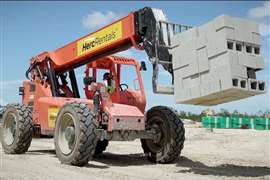Stability ahead? Construction activity in the Middle East
27 November 2009

Construction activity in the Middle East has slowed dramatically during the past 12 months. However, signs of a return to higher growth are beginning to emerge. Becca Wilkins reports.
The high level of construction activity in the Middle East has cooled in the past year, particularly so in Dubai. A lack of financing stemming from the global economic downturn has seen many major developments cancelled or postponed. However, activity is picking up in other areas of the region and even in Dubai the outlook is more positive.
Market shift
Chief executive of Leighton Holdings, Wal King, said although later to arrive, the global financial crisis has made an impact in the Middle East. The most affected country has been Dubai, UAE which, he said due to the speculative nature of much of its property market, has experienced a sharp contraction. Meanwhile, he added Abu Dhabi and Qatar are faring much better.
Dubai
The large number of projects that have been abandoned or postponed in Dubai during the past year reflects how much this particular country has suffered at the hands of the recession.
According to Mr King, projects worth US$ 500 billion, predominantly in Dubai, have been put on hold since the global financial crisis began, which he attributes to private funding difficulties and reduced commercial viability.
Among the projects in Dubai to have been affected is Emaar's Burj Dubai which was due to open at the beginning of September this year to coincide with the unveiling of the Dubai metro - the world's longest automated rail transport system. This is the latest in a string of delays to open what will be the world's tallest tower - originally it was scheduled to open at the end of 2008.
Other projects, that have been deferred or stopped in Dubai include, The Esplanade, Trump Tower, the Dubai Police Academy, Habtoor Grand Palm Resort, and the Olgana and Hilliana Towers.
However, Mr King said with no projects cancelled since mid-April, it is expected that this market has stabilised but with a lower level of activity.
Opportunities
In the meantime, other countries in the Middle East are providing encouraging signs for future construction activity.
Ilkay Fidan, sales and marketing director for Volvo in the Middle East said Saudi Arabia, Qatar, the UAE and Oman will provide the equipment manufacturer with good opportunities for growth.
Meanwhile, Mr King said Abu Dhabi remains the most promising market in the Middle East for the Group with significant infrastructure and building projects planned and already underway.
An example of this is the US$ 490 million contract that the Al Habtoor Leighton Group won in July this year to construct off-shore port facilities at the Khalifa Port and Industrial Zone in Abu Dhabi. The project includes the construction of 47 buildings and associated infrastructure including road networks, bridges, utility installations and hard and soft landscaping.
Mr King said, "I see further opportunities emerging in Qatar and new markets such as Oman, Kuwait, Bahrain and Saudi Arabia, as we further diversify the business from building to more infrastructure work.
"In the long term, the region still has vast reserves of oil and gas and these will continue to fuel construction opportunities for us as the countries of the Middle East seek to develop their economies."
Qatar
Interest in Qatar as a construction hot spot is increasing and is reflected by a number of projects planned or currently taking place.
This year Hochtief confirmed its biggest order in its history for the construction of the 8 km long Barwa Commercial Avenue scheme in Doha. The US$ 1.7 billion shopping and residential complex is due for completion in mid-2012. The complex is being constructed on Doha's southern edge and will comprise some 90 Ha of gross floor space - equivalent to about 110 football pitches.
Hochtief is also part of the consortium slated to construct the 40 km Bahrain-Qatar Causeway, the longest cross-border connection in the world.
Meanwhile a US$ 5.5 billion project to rebuild a 35 Ha area in the old part of Qatar's capital city is being developed by Dohaland, a unit of the non-profit Qatar Foundation. Construction of ‘The Heart of Doha' will be built in five phases and is planned for completion by the end of 2016.
The mixed use development will feature 226 buildings, ranging from three to 30 storeys, including residential units, offices, schools, hotels as well as a tramway, a national archive and a heritage quarter.
Gradual growth
As Scott Hazleton of Global Insight says in this month's economic outlook, business and consumer sentiment in the Middle East has improved over the past few months thanks to the recovery in oil prices, improving conditions in the world economy and some easing in the credit markets.
However, he added the slow thaw in credit markets means the recovery in 2010 is not expected to be strong.
Mr Fidan told iC the situation in the Middle East is much clearer than a year ago.
"The boom period of 2006 and 2007 is obviously over but the construction market is now showing positive growth. It is too optimistic to say that a full recovery is expected but positive growth is there for the coming months and years."






